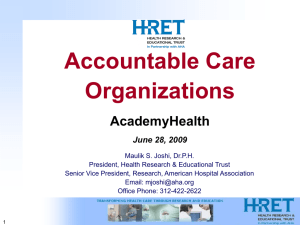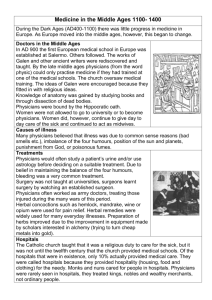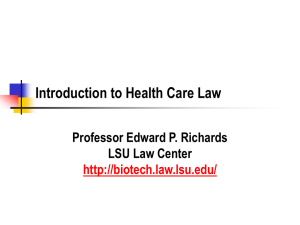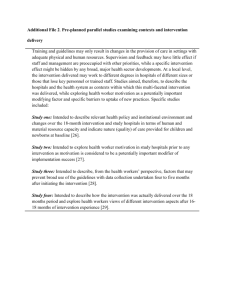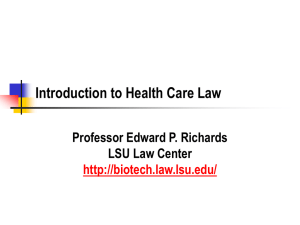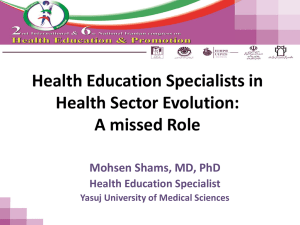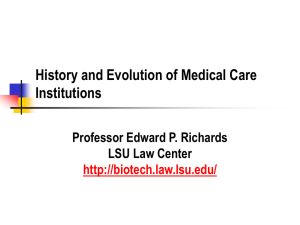Health Care Torts Spring 2004
advertisement
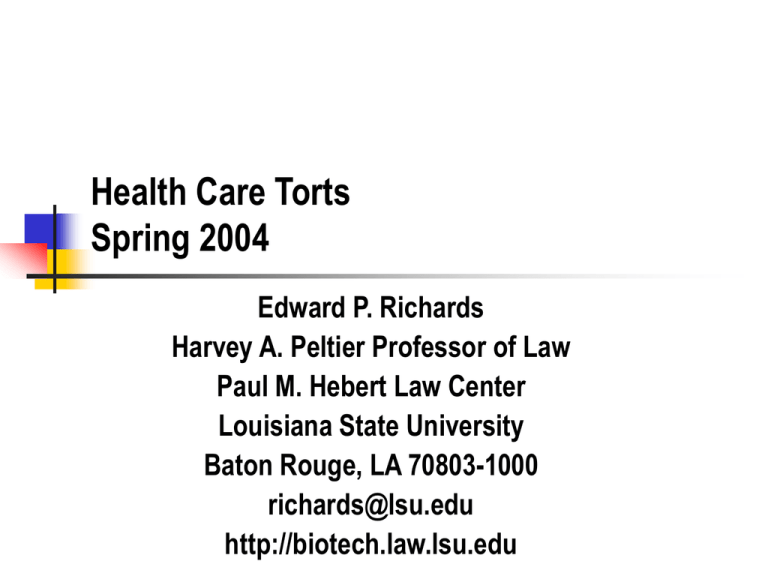
Health Care Torts Spring 2004 Edward P. Richards Harvey A. Peltier Professor of Law Paul M. Hebert Law Center Louisiana State University Baton Rouge, LA 70803-1000 richards@lsu.edu http://biotech.law.lsu.edu Course Organization Most of the classes will involve discussion of cases and other materials No book - everything will be on the WWW or handed out Limited PowerPoint 2 Discussion Groups You will be assigned to one of four groups Your group will be responsible for the materials assigned for a given day If we do not finish, you carry over until we finish the material If you are not in class when I call on you, you are responsible for group assignment due the next day you are in class, whether it is your group or the next If you do not prepare, I reserve the right to reduce your final grade by up to a letter 3 Purpose of the Course Law Learn basics of health care tort law in the US Learn the special issues of LA health care tort law Risk Management Discuss how to counsel clients to reduce liability Public Policy 4 Why Study Health Care Torts? Medicine is in flux There is no societal consensus on acute medical care or on prevention Health care finance is a mess Health care is seen as too expensive Ripe ground for tort law Difficult policy problems 5 Legal Role of Tort Law Interstitial Compensation Provides a compensation system for rare or unanticipated injuries Provides a background deterrence system for evolving societal problems Acts as a general claims resolution system for routine claims 6 Political Role of Tort Law Bread and Circuses Lottery Justice Creates the illusion of justice through anecdotal compensation and deterrence Defuses political action that would increase individual justice Generates high transaction costs that support the bar and politicians and entrench the system 7 Is Tort Law a Good Thing in Health Care? Pros Informed consent Helped highlight problems of managed care Can target unethical or incompetent behavior Cons Vaccine law Contraceptive liability Medical malpractice insurance issues Interferes with quality assurance 8 History of Medicine Why bother? Cavemen to the Civil War Rich literature Lots of theories of medicine Lots of treatments Only a few things worked at all Some cutting and sewing of wounds Some drugs - opium, digitalis On balance, you were better off without medical care 10 Pre-Modern Era Science Leads Practice Early 16th Century - Paracelsus -Transition From Alchemy Mid 16th Century - Andreas Vesalius - Accurate Anatomy Early 17th Century - William Harvey - Blood Circulation 1800 - Edward Jenner - Smallpox 1846 - William Morton - Ether Anesthesia 1849 - Semmelweis - Childbed Fever - Controlled Studies 1854 - John Snow - Proved Cholera Is Waterborne 11 The Profession - Through the 1870s Most Medical Schools are Diploma Mills No Bar to Entry to Profession Small Number of Urban Physicians are Rich Most Physicians are Poor Cannot Make Capital Investments Training Medical Equipment and Staff Physicians Push for State Regulation 12 Schools of Practice Allopathy Opposite Actions Toxic and Nasty Homeopathy Same Action as the Disease Symptoms Tiny Doses Less Dangerous Naturopaths, Chiropractors, Osteopaths, and Several Other Schools 13 Legal Consequences No Testimony Across Schools of Practice Different from Medical Specialties Surgery, Internal Medicine, Pediatrics All Same School of Practice - Allopathy All Same License Cross-Specialty Testimony Allowed Still important with the rise of alternative/quack medicine Locality rule - no national standards 14 Pre-Modern Hospitals L'Hotel-Dieu - Paris Myth dates it from medieval times Nursing, no medical care The Church did not believe in medicine US Hospitals Run by Nuns Just lodging and nursing 15 Legal Consequences Charitable Immunity Really want to sue a nun? Borrowed Servant Doctrine Seen as protective, but really allowed suit against the only solvent, reachable party Capitan of the Ship variant No legal relationship with the physicians 16 Beginnings of the Modern Era 1850 - Report of the Sanitary Commission Of Massachusetts 1860-1880s - Louis Pasteur - Scientific Method, Simple Germ Theory, Vaccination For Rabies, Pasteurization 1867-1880 - Joseph Lister - Antisepsis (Listerine) 1880s - Koch - Modern Germ Theory Organic Chemistry – 1880s - drugs 1860s - 1900s - Sanitation Movement - Modern Public Health 17 Modern Medicine and Surgery Surgery Starts to Work in the 1880s Surgery Can Be Precise - Anesthesia Patients Do Not Get Infected - Antisepsis Professionalism Starts to Matter What is a Quack if Nothing Works? Why Train if Training Does Not Matter? 18 Licensing and Education Effective Medicine Drives Licensing Licensing Limits Competition Physicians Start to Make Money Money allows investment in capital stock Training Equipment Staff 19 Hospital-Based Medicine Started With Surgery Medical Laboratories Bacteriology Microanatomy Radiology Services and Sanitation Attract Patients Internal Medicine Obstetrics Patients 20 Reformation of Hospitals Paralleled Changes in the Medical Profession Began in the 1880s Shift From Religious to Secular Began in the Midwest and West Not As Many Established Religious Hospitals Today, Religious Orders Still Control A Majority of Hospitals 21 Post WW II Technology Ventilators (Polio) Electronic Monitors Intensive Care Hospitals Shift From Hotel Services to Technology Oriented Nursing 22 Post World War II Medicine Conquering Microbial Diseases Vaccines Antibiotics Shift to Chronic Diseases Better Drugs Better Studies Childhood Leukemia Shift to Specialty Training 23 Health Care Finance Post WW II Kaiser started during the 1930s to care for workers on the Grande Coulee Dam Blue Cross/Blue Shield was started by docs and hospitals to assure their payment Health insurance became a common employment benefit during WW II to escape from wage controls Indigents were only covered by charitable institutions 24 Corporate Practice of Medicine Physicians Working for Non-physicians Concerns About Professional Judgment Cases From 1920 Read Like the Headlines Banned In Most States LA does not ban, but says there cannot be any control of medical decisionmaking http://biotech.law.lsu.edu/cases/la/adlaw/bome/ EmploymentofPhysician.pdf 25 Physician Practice Organization Mostly Small Sole Proprietorships Partnerships Then Professional Corporations Limited bargaining power Cannot join with other doc groups for bargaining because of antitrust laws Pressure to form larger corporate units 26 Impact of Corporate Practice Bans Physicians Do Not Work for Non-Governmental Hospitals Contracts Governed by Medical Staff Bylaws Sham of “Buying” Practices Physicians Contract With Most Institutions Charade of Captive Physician Groups Managed Care Companies Contact With Group Group Enforces Managed Care Company’s Rules Very important to sort out when you are filing a lawsuit 27 Legal Consequences when Suing Hospitals Physicians are Independent Contractors Hospitals Are Not Vicariously Liable for Independent Contractor Physicians Hospitals Are Liable for Negligent Credentialing and Negligent Retention Hospitals Can Be Liable if the Physician is an Ostensible Agent 28 Joint Commission on Accreditation of Hospitals 1950s Now Joint Commission on Accreditation of Health Care Organizations American College of Surgeons and American Hospital Association Split The Power In Hospitals Medical Staff Controls Medical Staff Administrators Control Everything Else Enforced By Accreditation 29 Contemporary Hospital Organization Classic Corporate Organizations CEO Board of Trustees Has Final Authority Often Part of A Conglomerate Medical Staff Committees Tied To Corporation by Bylaws Headed by Medical Director Constant Conflict of Interest/Antitrust Issues 30 Medical Staff Bylaws Contract Between Physicians and Hospital Not Like the Bylaws of a Business Selection Criteria Contractual Due Process For Termination Negotiated Between Medical Staff and Hospital Board If the met federal standards, peer review decisions are exempt from antitrust law attack 31 Managed Care Revolution Driven by special ERISA rules HMOs really started in the 1970s Caught fire in the 1980s Managed care high point in the late 1990s Liability concerns are pushing companies to passive management of costs Important legal issues on when you can sue the insurer for malpractice 32 Managed Care Pressures on Hospitals DRGs Capitation Negotiated Reimbursement Still Need Butts in Beds Must Get Them Out Quick and Cheap Death Can Be Very Cheap Right to Die – Yes Please Do!! 33 Managed Care Pressures on Docs When is Denying Care Cheaper? What is the Timeframe Issue? Insurers Now Control the Patients Employee Model Contractor Model De-selection Financial Death No Due Process 34 New Challenges Aging Population Emerging Infectious Diseases Antimicrobial Failure New Agents (HIV, Ebola) How To Pay For Health Care How To Deliver Health Care Medical Business Organizations 35
